'Yes, In God's Backyard': Affordable housing proposed on site of Scarborough church
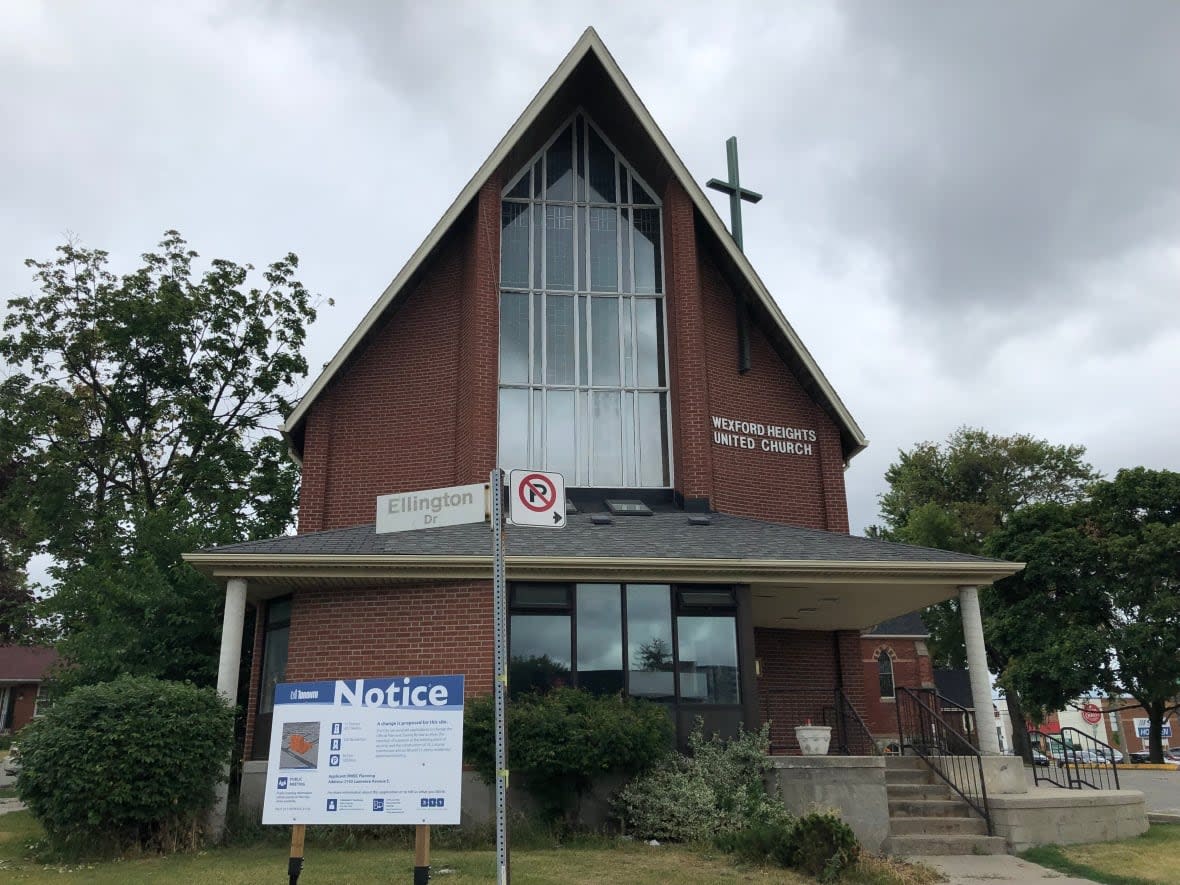
A new development company associated with the United Church of Canada is trying to breathe new life into a Scarborough church that officially closed in 2019 — by building affordable housing on the site while keeping some of its gathering spaces alive.
Kindred Works wants to build an 11-storey tower and two rows of townhouses —100 mixed-income rental units in all — while retaining the cemetery and community spaces on the former site of Wexford Heights United Church, located at 2102 Lawrence Ave. E.
"We need housing now," said Tim Blair, CEO of Kindred Works.
The United Church believes that housing is a fundamental human right, Blair says "so this certainly fits into the overall mission of the church."
It's all part of a growing continent-wide movement to build affordable housing on re-purposed church lands that some call YIGBY, which means "Yes, In God's Backyard" — a not-so-subtle dig at NIMBY, which stands for "Not In My Backyard."
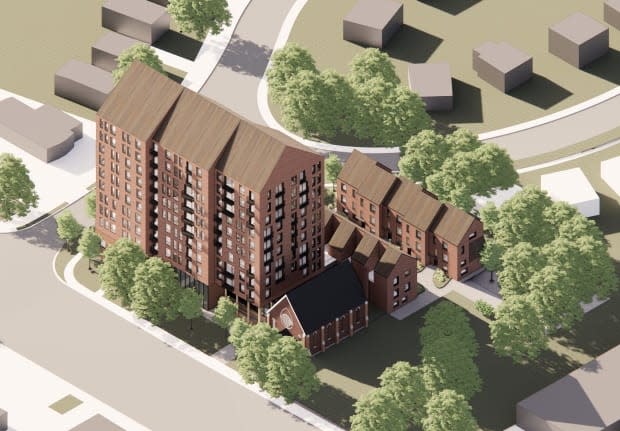
That's why Kindred Works is trying to create rental homes for 34,000 people on former United Church sites across Canada over the next 15 years, in many cases keeping the gathering spaces. Seven of those projects, like the one at Wexford Heights, are proposed in Toronto, where the need to build affordable housing is particularly acute
It's part of an effort to "make a meaningful impact and address the housing crisis across the country," Blair says.
Advocates approve
Housing advocates are singing the praises of the United Church for trying to transform its assets in this way.
"This is really a gold standard for how we can utilize space around existing properties that we have access to," said Eric Lombardi, who is with More Neighbours Toronto, a group that advocates for denser neighbourhoods and more affordable housing.
Lombardi says it's a useful model for governments to better utilize its own assets.
"The city and the province need to not only support these things super vocally, but really need to learn the lessons that they're teaching us about how to do this," he said.
Lombardi thinks making 30 per cent of housing affordable rental units is also a goal that governments should strive for. He says the emphasis is now mostly on home ownership, but many people cannot afford to buy property and are struggling.
Neighbours have concerns
But not everyone who live near the Wexford Heights site is a fan.
Homemade signs dot Ellington Drive, the church's cross-street, calling on surrounding homeowners to contact Coun. Michael Thompson, who represents the neighbourhood, to voice their opposition.
Helen Phillips's property is about 30 metres from the proposed project on the other side of the street. She says she made the signs and has collected eight pages filled with the names of concerned neighbours. She says she has mailed them to Thompson.
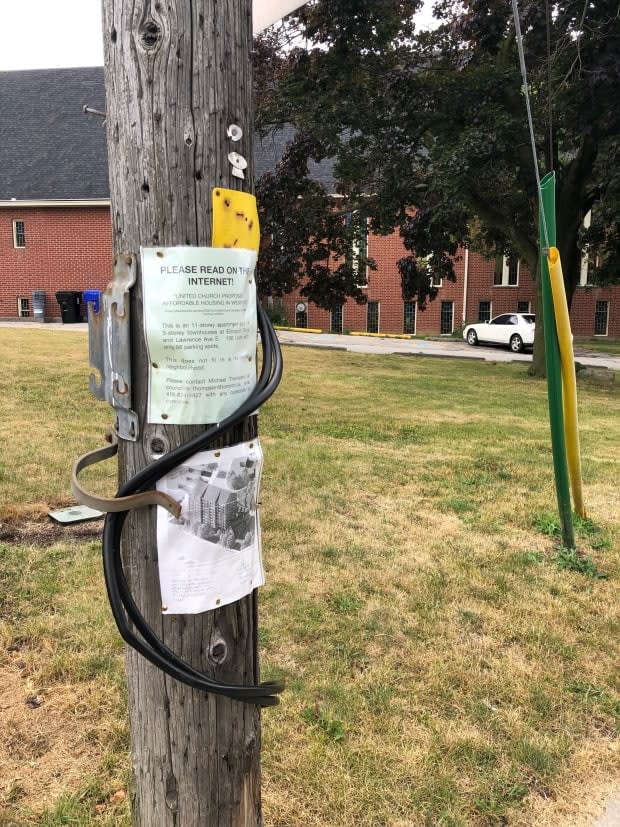
"There isn't anybody around here who's happy about this," said Phillips, a senior whose family has lived on the street for decades.
Phillips says the townhouse component of the project doesn't bother her, but the tower poses privacy concerns for nearby bungalows.
"It's right on our neighbourhood and if you can imagine an 11-storey thing … it's looming over us like a turkey vulture and we're a bunch of little sparrows," she said.
But she does say a middle-ground is possible — for example, she'd be okay with the proposal if there were no windows on the tower wall that faces the bungalows.
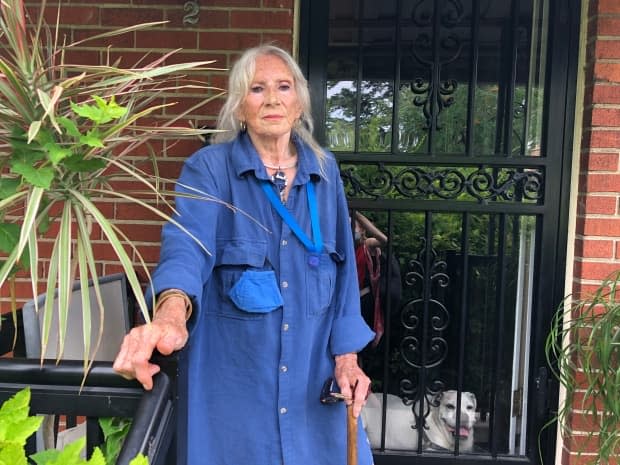
Another of Phillips's biggest concerns is parking. In its current form, the project would have only about half as many parking spaces as units. She says that will mean many tenants and their visitors will have to park on the surrounding streets.
When asked to comment, David Constable, the project's architect with KPMB, noted the site's proximity to existing and planned mass transit and bicycle infrastructure, the support for low automobile use from businesses in the area and the extensive bike storage included in the proposal.
The city's rules no longer require a minimum number of parking spaces for a development.
Philips's third concern is a lack of space for tenants' children to play. A five-storey building could allow for a reasonable green play-space on the roof, she says.
For his part, Thompson says while there is absolutely a need to build more affordable housing, it is important to hear out concerns.
"It's complex…but it's something that I do genuinely believe that we'll be able to work our way through."
Approval could be a long time coming
The city won't hold public consultations on the project during the municipal election period.
Jeffery Sinclair, the city's planner responsible for the proposal, told CBC News the project will be ready for review by the Scarborough Community Council in early 2023 and community consultations should follow.
But, he says, the proposal qualifies for a prioritized review, because affordable housing is its focus.
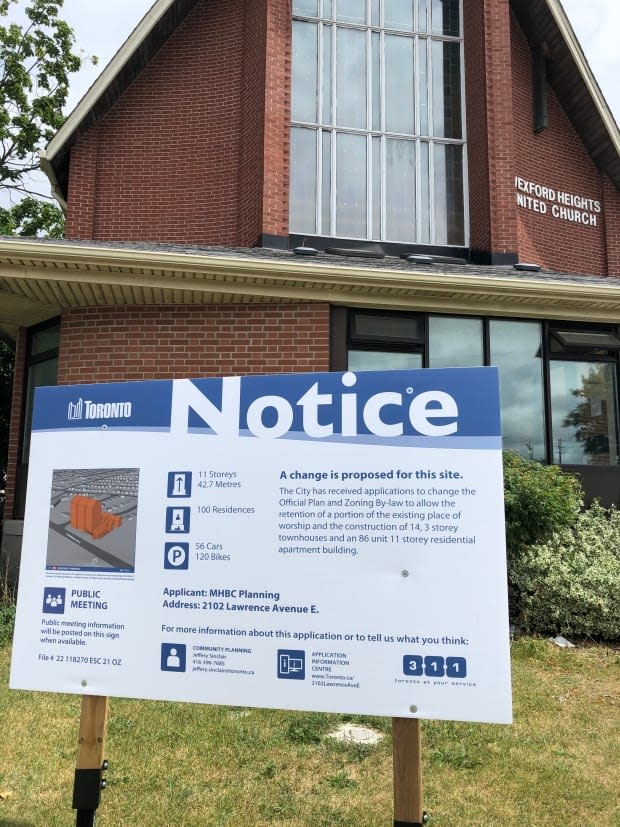
Mark Richardson, the technical lead for the group HousingNowTO, says the process to build affordable housing takes too long, costing developers thousands of dollars, and governments need to take steps to accelerate it.
"We have no idea whether the building will be financially viable at that size and scale a year from now," he said, adding the extra costs can't be passed on to consumers, as they are with condo projects, which means some proposed rental projects evaporate.
"Every day we wait, every month we delay, every process hoop we have to go through, makes it harder for the City of Toronto to reach its target of 40,000 new affordable housing units approved by 2030."


